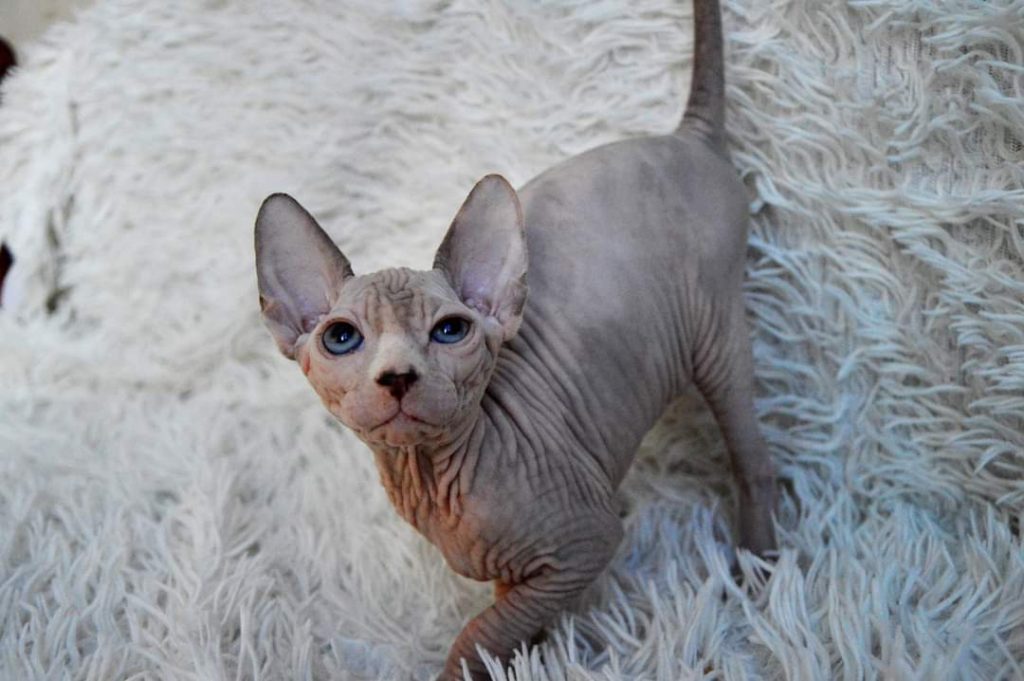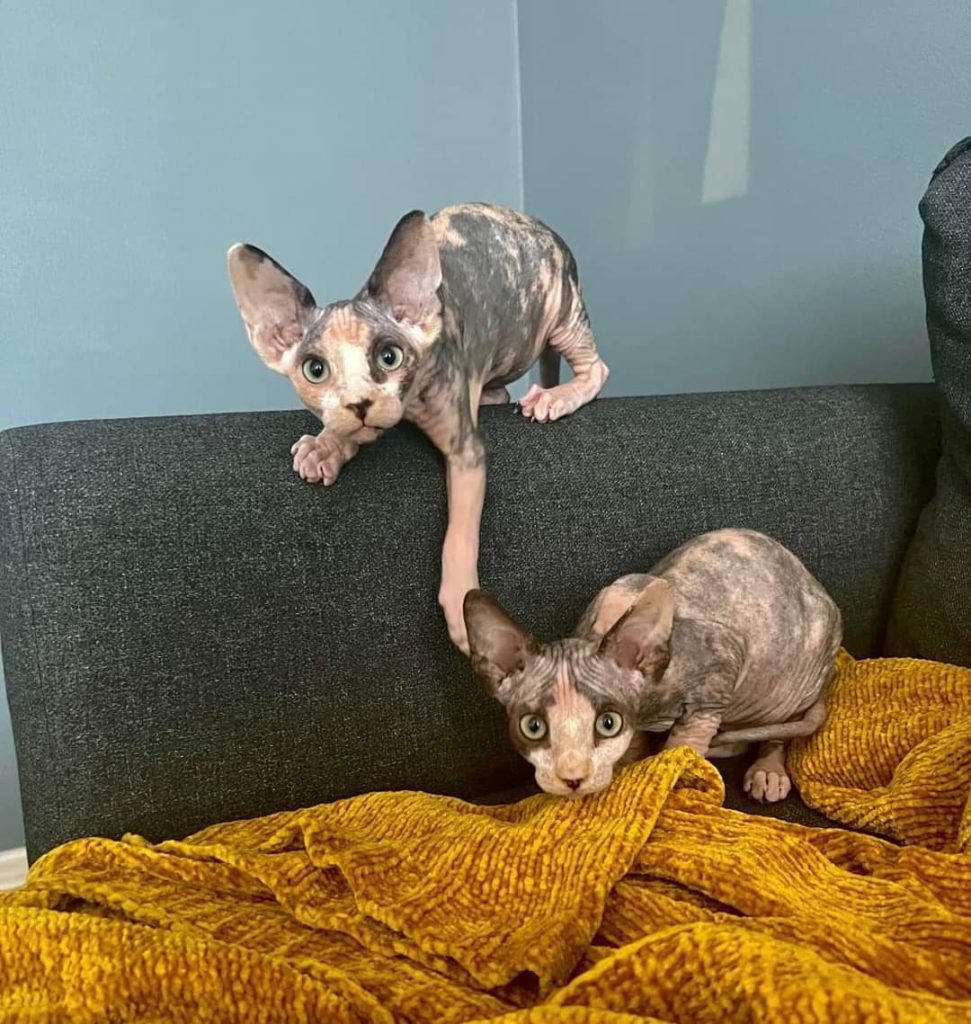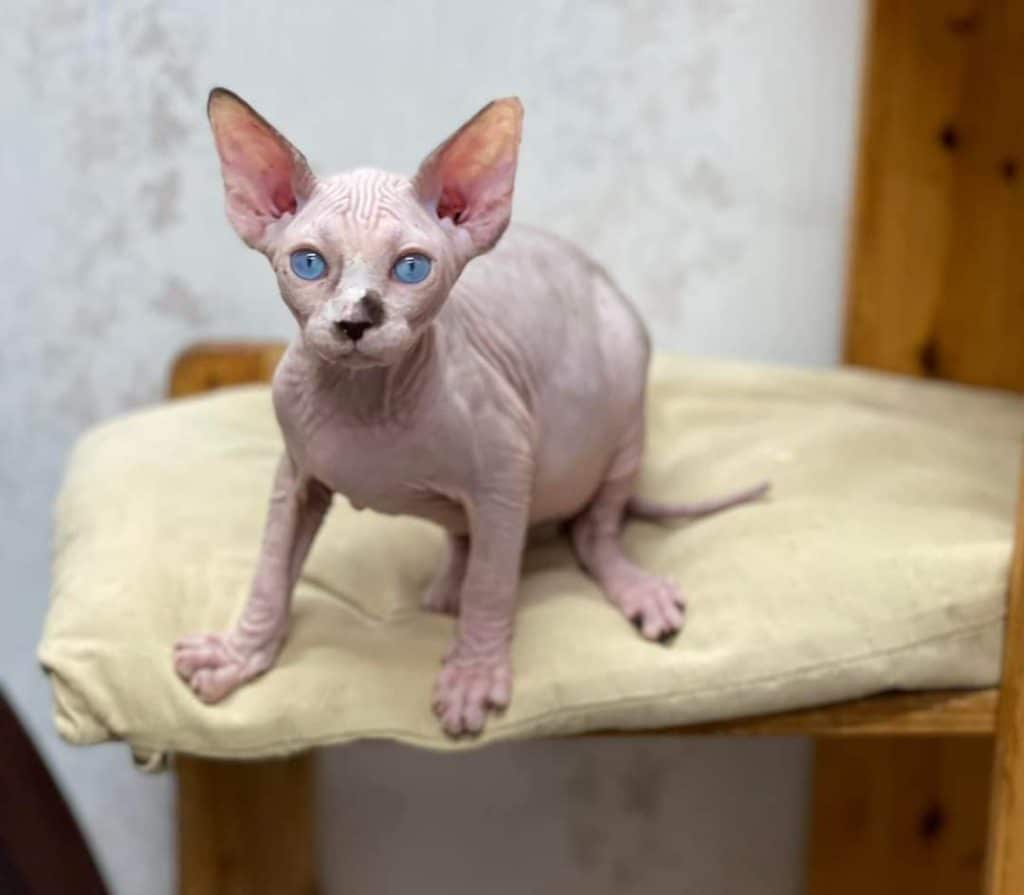Personality, temperament and sphynx cat behavior problems.
About The Sphynx Cat
The sphynx is a medium-sized cat with a striking appearance, identified by hairless, wrinkled skin and large ears. She has a sleek, muscular body that is dense and heavy for her size.

Sphynx cat behavior and personality traits
The sphynx cat is an energetic and acrobatic performer who loves to show off for attention.
Sphynx cats have a sense of humor that is often opposite to their sour expression.
Friendly and loving: Sphynx cats are a loyal breed who will follow you around the house and try to get involved in whatever you’re doing.
They will grab any opportunity to perch on your shoulder or curl up in your lap.
As curious and intelligent as she is energetic, these traits can make her a bit of a handful.
For her own safety, the sphynx does best as an exclusively indoor cat, and generally gets along well with children other pets.
What to expect from your Sphynx cat
The sphynx cat is a strong and hardy breed with few health problems.
Although the breed doesn’t have any genetic disease predispositions, a few health conditions have been known to affect sphynx cats, including hypertrophic cardiomyopathy (HCM), which is a disease that causes thickening of the heart muscle and can be detected with an echocardiogram, and hereditary myopathy, a condition affecting muscle function.
Check out more about the health issues common in Sphynx cat in this great and detailed article we wrote on it.
When adopting a sphynx cat, avoid breeders who refuse to offer a health guarantee on kittens or who make claims that their line is guaranteed HCM-free.
Although this condition isn’t hereditary, it’s a fairly common form of heart disease in cats and no breeder can guarantee with absolute certainty that a cat won’t develop HCM.
This is an active breed who enjoys jumping, playing and climbing, as well as normal cat scratching.
Scratching surfaces should be provided, along with places to climb and perch.
Despite her hairlessness, the sphynx is not considered hypoallergenic because her skin still produces normal amounts of allergy-causing dander.
Sphynx cats tend to have oily skin and need to be bathed regularly to avoid becoming greasy.
Special care should also be taken to protect these cats from sunburn and skin damage, as well as from cold temperatures, although the sphynx tends to be an expert at finding snug places to curl up and get warm. Nevertheless, sweaters and coats tailored to the sphynx cat are commercially available.

Behavior problems in Sphynx Cats
1. Sphynx cats are prone to separation anxiety
Sphynx cats are so affectionate towards their owners that it becomes a problem when their owners are not around.
This separation anxiety behavior can be prevented by getting a second cat or making out more time to spend with your Sphynx cat.
Some people say Sphynx cats are mean, and separation anxiety is one of the behavior problems that can trigger off aggression in Sphynx cats.
This means that Sphynx cats should not be left alone for too long else they will develop separation anxiety.
2. Sphynx cats are too clingy and needy
If you are the type that is always at home and won’t mind your cat following you around or wanting your undivided attention then Sphynx cat is good for you.
On the other hand, if you want a cat that understands privacy that will not cling to you all day long, then Sphynx cat is not for you.
3. Sphynx cats avoid litter box when stressed
One of the most prevalent Sphynx cat behavior concerns is avoiding litter boxes when they are bored, irritated, depressed, or ill.
Sphynx cats may develop litter box troubles when you bring a new family member home, even if they haven’t exhibited any indications of it previously.
4. Sphynx cats are easily depressed
While Sphynx cats are known for their high levels of activity, Sphynx cats can get depressed as a result of separation anxiety, loneliness, or a constant shift in routine.
If a Sphynx cat’s sadness isn’t handled, it might lead to excessively aggressive behavior against other members of the household.
A depressed Sphynx cat may attempt to run and become a wild cat, or it may bite and nip.

Ways to stop unwanted behaviors in Sphynx cats
Here are some pointers to help you stop or prevent your Sphynx cat from behaving badly:
- From the time it is a kitten, your Sphynx cat must be well socialized.
- A second pet, either a cat or a dog, should be provided as it can help prevent separation anxiety.
- Recognize and address the emotional and physical requirements of your Sphynx cat.
- Instead of yelling at your Sphynx cat, be patient and make the necessary changes.
- Purchase a large number of fascinating and interactive toys for your Sphynx cat.
- Veterinary examinations are necessary on a regular basis.
- Every day, give your Sphynx cat some type of exercise, even if it’s fetch game.
- Positive reinforcement should always be used instead of negative or severe reinforcement.
- Positive conduct should always be rewarded, while negative behavior should be discouraged.
Are you interested in adopting a Sphynx kitten? Then learn more about our adoption process or see our available kittens.